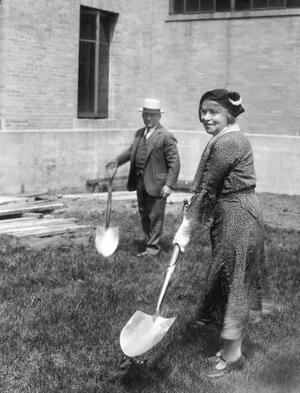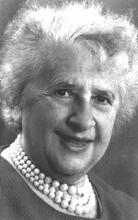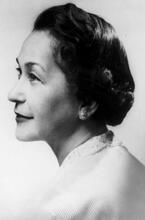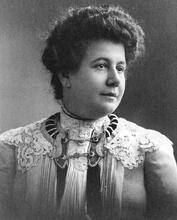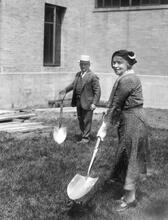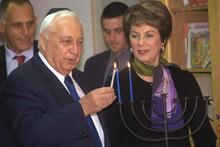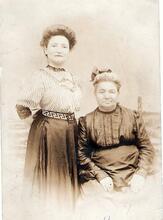Gussie Edelman Wyner
Courtesy of the American Jewish Historical Society.
Blending business skills with activism, Gussie Edelman Wyner created life memberships for Hadassah and other nonprofit organizations as a way to raise funds and cement commitment. After her marriage, she became involved in Hadassah and created one of the first Junior Hadassah chapters. She helped raise funds for the Hadassah Hospital in Israel and also served as treasurer of the Women’s Auxiliary of Beth Israel Hospital in Boston, where she created the concept of life memberships. The funds she raised through life memberships paid for advances including a new maternity ward, a generator, and a surgical lab. As treasurer of the Boston chapter of Hadassah, she again incorporated the life membership concept with great success, inspiring other Jewish nonprofits to do the same.
Gussie Edelman Wyner was an early leader of the Boston Jewish community and a national leader of Hadassah who is credited with creating the idea of life memberships in women’s organizations and with establishing the first chapter of Junior Hadassah.
Early Life and Marriage
Gussie Wyner was one of six children born in Minsk to Rabbi Abraham and Esther Edelman. In the 1880s the Edelman family immigrated to New York, where the young Gussie managed a home-based garment manufacturing business. In 1890, she married George Wyner, a merchant who had migrated from Vilna to South Africa, whom Gussie had met when he was visiting relatives in the United States. She agreed to emigrate to Malmsbury, South Africa, on the condition that, if she did not like it there after ten years, they would return permanently to the United States. After a stop in London, the Wyners returned to Boston in 1899, one year before the required ten years agreed to.
Gussie and George Wyner had five children: Frances, Isidore A. (“I.A.”), Rudolph, Edward, and Maurice. While raising her five children and managing an extensive household, Gussie Wyner became one of the pioneers in women’s leadership and made significant contributions to the women’s Zionist movement and Boston Jewish communal life.
Zionism and Hadassah
Wyner’s devotion to Zionism grew out of the Edelman family’s attachment to Palestine as a religious homeland. In the later years of their lives, both Gussie Wyner’s grandfather and father had moved to Palestine to study and, eventually, to die. In the 1920s, Wyner traveled to Palestine several times, once in the company of Henrietta Szold, the founder of Hadassah, for the joint purpose of assessing the medical needs of in the land and of visiting her father. When he died in 1927, Gussie Wyner arranged his burial on the Mount of Olives, where her grandfather was also interred.
In the main, however, Wyner’s Zionism was lived out in America. She was an early officer of the Boston chapter of Hadassah. On her initiative, the Boston chapter established what is believed to be the first Junior Hadassah chapter, and her daughter-in-law Sara Goldberg Wyner served as its first president. The success of the Boston Junior Hadassah chapter inspired the creation of other chapters around the United States.
Gussie Wyner took an active role in raising funds for the first Hadassah Hospital in Jerusalem and was especially proud of her work in supporting the treatment of eye disease in the Jewish and Arab children of Palestine. A memorial resolution adopted by the Boston chapter of Hadassah on the occasion of Wyner’s death said:
A full decade before National Hadassah had even planned the magnificent Rothschild Hadassah University Hospital on Mt. Scopus, Mrs. Wyner organized fund-raising functions ... for a research hospital in Palestine. When Palestine asked Hadassah to build a teaching-clinical university hospital, the Boston Chapter was the first to respond with fifty thousand dollars because Mrs. Wyner, the builder, had been assembling the bricks.
Other Work
Wyner left her most indelible mark as an officer of the Women’s Auxiliary of Boston’s Beth Israel Hospital. As treasurer of the Women’s Auxiliary in 1927, she proposed the creation of the new concept, the Life Membership Fund, as a way to raise needed capital gifts and endowment funds for the hospital. She insisted that the proceeds of the Life Membership Fund be used for “tangible improvements” to the hospital’s facilities, such as a new maternity ward, a surgical research lab, housing for hospital interns, an electric generator, and a children’s pavilion. Wyner held the post of treasurer of the auxiliary until her death in 1949. She also served on Beth Israel’s Board of Trustees. Her devotion to Beth Israel was continued through the service of her son Rudolph as president and her grandson Justin on the Board of Trustees.
The Life Membership Fund concept proved to be an attractive means for soliciting funds to meet long-term goals, and under Wyner’s direction as treasurer it was subsequently adopted by the Boston chapter of Hadassah, which called it Perpetual Membership, followed by many Jewish and non-Jewish charitable organizations around the United States.
Legacy
Gussie Wyner’s funeral was attended by prominent communal, organizational, civic, and state officials, including Massachusetts governor Paul Dever, who honored her efforts to improve the social welfare of Boston. She was eulogized by Rabbi Irving Mandel as having “made philanthropy and community endeavor her spiritual vocation,” as well as for being the “architect and engineer, strategist and tactician” of the Jewish organizations to which she had devoted her adult years. Tamar De Sola Pool wrote of Gussie Wyner: “Often when I sat beside her at conventions, Hadassah meetings and in her home, I would say to myself, ‘It is this which has assured the survival of the Jewish people, this innate knowledge of what it means to be a Jew, and this unswerving determination to live a Jewish life on the highest plane of our heritage.’”
Combined Jewish Appeal. Fifty Years of Jewish Philanthropy in Greater Boston, 1895–1945: 50th Anniversary Yearbook of the Combined Jewish Appeal. Boston: Combined Jewish Appeal, 1945.
Solomon, Barbara Miller. Pioneers in Service: The History of the Associated Jewish Philanthropies of Boston. Boston: Associated Jewish Philanthropies, 1956.

